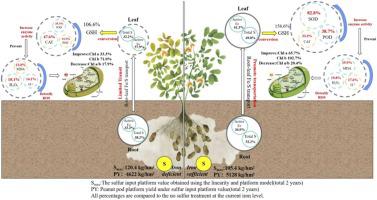当前位置:
X-MOL 学术
›
Eur. J. Agron.
›
论文详情
Our official English website, www.x-mol.net, welcomes your
feedback! (Note: you will need to create a separate account there.)
Exogenous sulfur application can effectively alleviate iron deficiency yellowing in peanuts and increase pod yield
European Journal of Agronomy ( IF 4.5 ) Pub Date : 2024-06-24 , DOI: 10.1016/j.eja.2024.127252 Xiao-yan Zhang , Wen-feng Hou , Ze-chang Gou , Shu-ran Jia , Han Li , Qiang Gao , Xiao-yu Li
European Journal of Agronomy ( IF 4.5 ) Pub Date : 2024-06-24 , DOI: 10.1016/j.eja.2024.127252 Xiao-yan Zhang , Wen-feng Hou , Ze-chang Gou , Shu-ran Jia , Han Li , Qiang Gao , Xiao-yu Li

|
Iron deficiency yellowing is a serious and widespread problem that seriously affects plant growth and development, ultimately damaging plant yield. Sulfur is one of the essential elements for plant growth and development, and plays an important role in crop stress resistance. Iron (Fe) and sulfur (S) play a core role in the mineral nutrients required for plant metabolism, as both elements are essential for the activity of several proteins involved in basic cellular processes. This research used peanuts as materials to explore the effect of exogenous sulfur on alleviating iron deficiency and yellowing in peanuts under iron deficiency and iron enrichment levels. A two-year field experiment was conducted on windblown sandy soil to determine peanut yield, photosynthetic rate, photosynthetic pigment content, and the activity of key enzymes such as protective enzymes in leaves and roots. The results showed that the application of exogenous sulfur can increase pod yield by an average of 12.6 %-21.6 %. The application of exogenous sulfur significantly increased the migration of iron from roots to the ground, and increased the accumulation of active iron in young leaves by 42.6–73.2 %. Exogenous sulfur application increased the content of GSH in leaves, reduced the damage of Fe-deficient to leaf tissue structure, and effectively increased or maintained the accumulation of photosynthetic compounds in leaves. In addition, exogenous sulfur application at Fe-sufficient levels promoted dry matter accumulation while increasing N and S nutrient content, thereby increasing the N: S ratio. Therefore, exogenous sulfur application significantly increased the content of Chl a and Chl b in leaves, as well as the net photosynthetic rate. The application of exogenous sulfur increased the activity of SOD, POD, and CAT enzymes in roots and leaves, decreased the content of HO and MDA in leaves, and reduced the rate of O generation, thereby enhancing the plant's resistance to oxidative stress. This confirms that the application of exogenous sulfur and sufficient iron is of great significance in reducing iron deficiency yellowing in peanuts and improving yield.
中文翻译:

外源硫磺施用可有效缓解花生缺铁黄化,提高荚果产量
缺铁黄化是一个严重而普遍的问题,严重影响植物生长发育,最终损害植物产量。硫是植物生长发育必需的元素之一,在作物抗逆性中发挥着重要作用。铁 (Fe) 和硫 (S) 在植物代谢所需的矿质营养素中发挥着核心作用,因为这两种元素对于参与基本细胞过程的多种蛋白质的活性至关重要。本研究以花生为材料,探讨缺铁和富铁水平下外源硫对缓解花生缺铁黄变的影响。在风吹沙土上进行了为期两年的田间试验,测定了花生产量、光合速率、光合色素含量以及叶和根中保护酶等关键酶的活性。结果表明,施用外源硫,平均可增产12.6%-21.6%。施用外源硫显着增加了铁从根部向地面的迁移,幼叶活性铁的积累增加了42.6%~73.2%。外源硫施用增加了叶片中GSH的含量,减少了缺铁对叶片组织结构的损害,有效增加或维持了叶片光合化合物的积累。此外,在Fe充足水平下施用外源硫促进了干物质积累,同时增加了N和S养分含量,从而提高了N:S比。因此,施用外源硫显着提高了叶片中叶绿素a和叶绿素b的含量,以及净光合速率。 施用外源硫提高了根和叶中SOD、POD、CAT酶的活性,降低了叶片中H2O和MDA的含量,降低了O生成率,从而增强了植物对氧化胁迫的抵抗能力。这证实施用外源硫和充足的铁对于减少花生缺铁黄变、提高产量具有重要意义。
更新日期:2024-06-24
中文翻译:

外源硫磺施用可有效缓解花生缺铁黄化,提高荚果产量
缺铁黄化是一个严重而普遍的问题,严重影响植物生长发育,最终损害植物产量。硫是植物生长发育必需的元素之一,在作物抗逆性中发挥着重要作用。铁 (Fe) 和硫 (S) 在植物代谢所需的矿质营养素中发挥着核心作用,因为这两种元素对于参与基本细胞过程的多种蛋白质的活性至关重要。本研究以花生为材料,探讨缺铁和富铁水平下外源硫对缓解花生缺铁黄变的影响。在风吹沙土上进行了为期两年的田间试验,测定了花生产量、光合速率、光合色素含量以及叶和根中保护酶等关键酶的活性。结果表明,施用外源硫,平均可增产12.6%-21.6%。施用外源硫显着增加了铁从根部向地面的迁移,幼叶活性铁的积累增加了42.6%~73.2%。外源硫施用增加了叶片中GSH的含量,减少了缺铁对叶片组织结构的损害,有效增加或维持了叶片光合化合物的积累。此外,在Fe充足水平下施用外源硫促进了干物质积累,同时增加了N和S养分含量,从而提高了N:S比。因此,施用外源硫显着提高了叶片中叶绿素a和叶绿素b的含量,以及净光合速率。 施用外源硫提高了根和叶中SOD、POD、CAT酶的活性,降低了叶片中H2O和MDA的含量,降低了O生成率,从而增强了植物对氧化胁迫的抵抗能力。这证实施用外源硫和充足的铁对于减少花生缺铁黄变、提高产量具有重要意义。











































 京公网安备 11010802027423号
京公网安备 11010802027423号